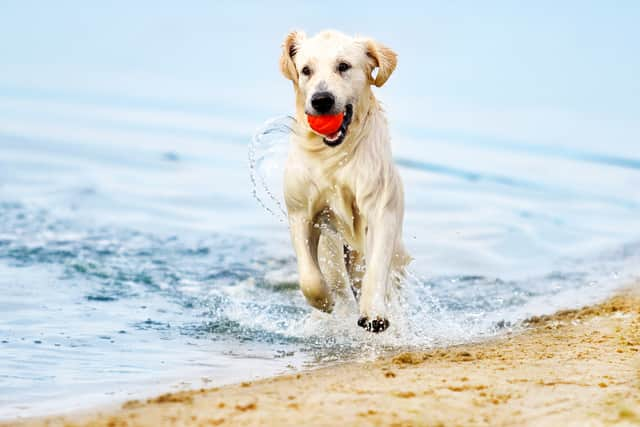Brits could face up to £1,000 fine for taking their dog to the beach - list of dog-friendly UK beaches
and live on Freeview channel 276
As the nicer weather continues to hit the UK people will be looking to spend more time outdoors and what better way to do that than with your four-legged members of the family. Taking your dog to the beach is one of the best ways to spend a sunny day.
However, experts have warned that dog owners should take extra precaution on which beach they take their dogs following the introduction of Public Space Protection Orders (PSPO) by local authorities.
Advertisement
Hide AdAdvertisement
Hide AdExperts at Kennel Store say: “While everyone enjoys a seaside day out in the summer, dog owners, unfortunately, will face restrictions on where they can take their pet on beaches as both temperatures and visitor numbers increase.”
While dog owners may be disappointed that they cannot bring their pet to their favourite beach for some sun, sea and sand, there are still many dog-friendly beaches across the UK they can visit with their pet.
So, which areas have implemented summer dog-bans for some of their beaches? Here’s everything you need to know including tips when visiting dog-friendly beaches.
Which beaches have dog bans in place?
Dog bans will take place from the start of May until the end of September at beaches in locations across the UK including:
Advertisement
Hide AdAdvertisement
Hide Ad- Hampshire
- Scotland
- Northumberland
- Yorkshire
- Cornwall
Kennel Store also shared their full breakdown of beaches with dog bans for the summer months.


Tips to Follow if Visiting a Dog-Friendly Beach
There are still many dog-friendly beaches across the UK they can visit with their pet as long as they follow these essential tips from the experts at Kennel Store:
Keep Your Dog on a Leash
Even if they are well-behaved, keep your dog on a leash to prevent them from wandering off or getting into dangerous situations, especially in busy areas with many people and other dogs around. Opt for a sturdy, longer leash that allows your dog to explore while still keeping them in your sight.
Train Your Dog With Commands
Ensure your dog’s and others’ safety at the beach by teaching your dog basic commands like “stay”, “come”, and “leave it” that will prevent them from wandering off, approaching dogs and people without permission, or eating something harmful. Also, consistent training will help protect your dog, strengthen your bond, and make your trips more enjoyable.
Advertisement
Hide AdAdvertisement
Hide Ad

Monitor your dog’s behaviour
Regularly checking your dog’s behaviour while at the beach is key to ensuring their safety and well-being. Keep an eye on their body language and behaviour, as stress, agitation, and over-excitement can all be signs of discomfort or distress. If you notice these signs in your dog, it is time to take a break from the beach or move to a quieter space to calm your pet down.
Remember to clean up waste after your dog
It is essential to be respectful of others at the beach and clean up after your dog; other animals could risk consuming your dog’s waste and developing illnesses if the stool is contaminated with parasites or toxins and even poses issues for the beach, water and wildlife. Remember to bring bags to collect your dog’s stool and dispose of it in a designated bin.
Penalty for bringing your dog to the beach
Local authorities in Hampshire, Scotland, Northumberland, Yorkshire and Cornwall have carried out Public Space Protection Orders to restrict dogs from beaches from the beginning of May until the end of September. Durham County Council are also considering a PSPO for dogs.
If the conditions of the PSPO are breached, dog owners will face a Fixed Penalty Notice of £100 under the council enforcement policy. Failure to pay the initial fine will lead to a prosecution, which if convicted, will make you liable for an increased £1000 penalty.
Comment Guidelines
National World encourages reader discussion on our stories. User feedback, insights and back-and-forth exchanges add a rich layer of context to reporting. Please review our Community Guidelines before commenting.
